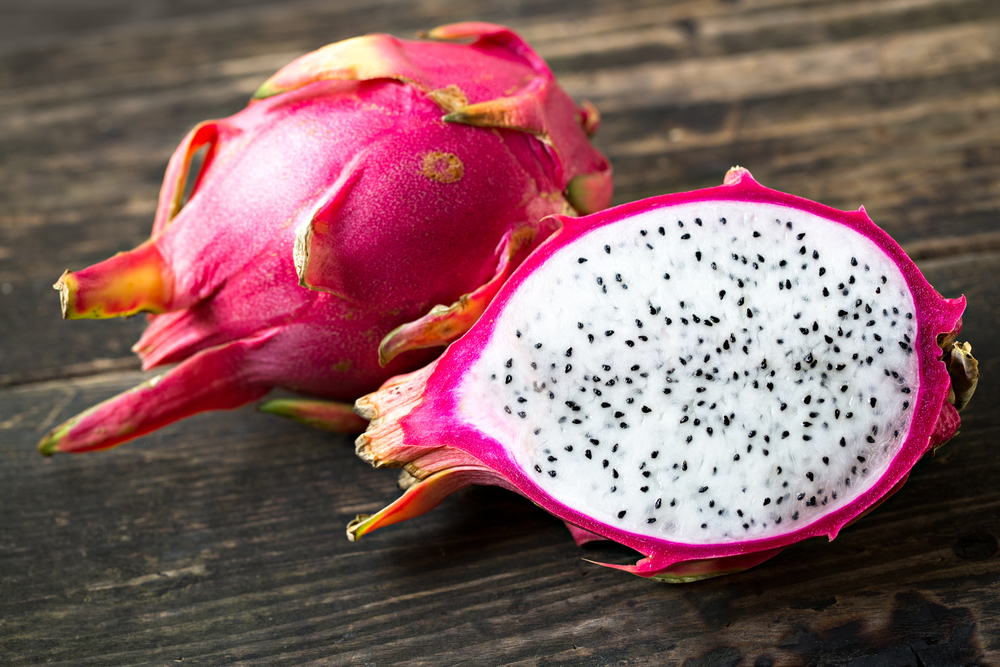The Health Benefits of Dragon Fruit

Dragon fruit is a rather interesting fruit that is grown around the world. However, not everyone knows it was originally from Mexico and Central America. The colloquial name suggests something vaguely tropical to people, which implies something like the Caribbean or maybe some hidden spot in the Mediterranean. In truth, it grows on a cactus. The reddish fruit has a stunning appearance that captures people’s imaginations which likely lead to its rather fanciful name. It quite literally appears to have red or green scales depending on the variety you see. The pulpy interior of fruit can be white or red and has visible seeds and is credited with tasting similar to a mix between a kiwi and pear by most people. You might have heard people extolling the virtues of this fruit recently due to it being caught up in a trend of potential health foods. Trends have a way of exaggerating things however, so we’re going to take a closer look at some of the known health benefits of eating dragon fruit.
Fiber
We don’t always think of this as a direct benefit to eating fruit as we more often think of vegetables or grains instead. Dragon fruit is a decent source of fiber. The fiber in the fruit is useful for helping to maintain your digestive health. It helps to aid the body in easing the passage of waste as a prominent benefit. The other benefits shouldn’t be underestimated though. Fiber rich diets are known for helping people to maintain a healthier weight than they would otherwise. Additionally, such diets have been linked to lower levels of unhealthy cholesterol as well as healthy blood sugar levels. Don’t underestimate the benefits of a good source of fiber as a result. Dragon fruit can offer you that extra sweet treat you’re craving throughout the day while still offering you some health benefits. It beats speed eating seeds, doesn’t it?
Vitamin C
Like a lot of fruits, dragon fruit actually has a decent level of vitamin C. This vitamin is highly useful for your body as it helps with many processes. It is particularly useful for those of us interested in our health as we age. Vitamin C is known to help bolster various repair processes within the body by providing easily accessible materials that the body needs. This takes the form of providing vital components for collagen production in many places around the body. It is important to note that eating dragon fruit will spread these benefits across your entire body without any real target. If you want to specifically target your skin, you’ll want to look for products using dragon fruit extract. This will magnify the benefits for that particular part of your body at the expense of benefiting the others.
Antioxidants
All that vitamin C, as well as other components of the fruit actually mean that dragon fruit is good for your overall health in yet another way: antioxidants. These lovely compounds provide your body with a clear answer to all the free radicals your body is bombarded with by the sun every day and the ones that sneak in through other means. Free radicals are, in essence, moving sources of minute damage in your body that cause relatively little damage on their own, but build up over time. This leads to escalating damage that may actually be associated directly with how the body ages. Studies are still out on how closely they are interlinked, but incorporating sufficient antioxidants into your diet is known to have a positive benefit on the body. It is believed this is due to them helping to ease and minimize the amount of damage that your body has to repair constantly. This, in turn, leads to an improvement in overall health.
Dragon fruit isn’t a miraculous fruit that fell from the sky in long lost jungles. It is a simple cactus fruit with many of the same benefits of other fruits. The fruit can at least boast a rather interesting appearance though that makes it easy to see why people would call it a “dragon” fruit. Do take the time to sample the fruit if you get a chance as you might like it. Just do so sensibly and don’t eat it if you have an allergy to similar fruits.

